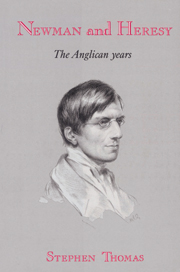Book contents
- Frontmatter
- Contents
- Acknowledgments
- A short glossary of heresies
- Introduction
- PART ONE DEFENCE: ARIANISM AND THE CHURCH–STATE CRISIS
- PART TWO ATTACK: SABELLIANISM AND APOLLINARIANISM – LIBERALISM UNMASKED.
- PART THREE RETREAT AND REALIGNMENT: MONOPHYSITISM AND THE COLLAPSE OF THE ‘VIA MEDIA’
- 15 Construction
- 16 Collapse
- 17 Rhetoric refashioned
- Conclusion
- Notes
- Bibliography
- Index
17 - Rhetoric refashioned
Published online by Cambridge University Press: 23 November 2009
- Frontmatter
- Contents
- Acknowledgments
- A short glossary of heresies
- Introduction
- PART ONE DEFENCE: ARIANISM AND THE CHURCH–STATE CRISIS
- PART TWO ATTACK: SABELLIANISM AND APOLLINARIANISM – LIBERALISM UNMASKED.
- PART THREE RETREAT AND REALIGNMENT: MONOPHYSITISM AND THE COLLAPSE OF THE ‘VIA MEDIA’
- 15 Construction
- 16 Collapse
- 17 Rhetoric refashioned
- Conclusion
- Notes
- Bibliography
- Index
Summary
THE ‘ESSAY ON DEVELOPMENT’: ANGLICAN OR ROMAN?
The rhetorical ‘placing’ of Anglicanism against the spectrum of theological parties in Antiquity may, or may not, as we have seen, be traceable back to 1839. What is certain is that this strategy first appears in Newman's public discourse only in the Essay on Development, composed between the beginning of 1845 a n d October of the same year.
But is the Essay on Development an ‘Anglican’ writing? J.J. Byrne's article on ‘The Notion of Doctrinal Development in the Anglican Writings of J.H. Newman’ includes the Essay in his survey, and defines ‘Anglican writings’ as ‘all that Newman wrote in the years 1825–1845’. Technically, Newman was an Anglican while he was composing the Essay, in the semi-monastic seclusion of Littlemore. The work was substantially complete, when Dominic Barberi received him on 8 October 1845: ‘As I advanced, my difficulties so cleared away that I ceased to speak of “the Roman Catholics”, and boldly called them Catholics. Before I got to the end, I resolved to be received, and the book remains in the state in which it was then, unfinished’. Newman's 1864 account suggests that he was working through a residual Anglicanism, and that, as the work progressed, he wrote himself into a decision.
However, the character of the Essay as an ‘hypothesis to account for a difficulty’, that is, an attempt to remove historical difficulties as obstacles to a full assent to Roman dogma, hardly confirms Newman's own suggestion of its exploratory character. Indeed, the die had been cast some time before.
- Type
- Chapter
- Information
- Newman and HeresyThe Anglican Years, pp. 228 - 247Publisher: Cambridge University PressPrint publication year: 1991

